

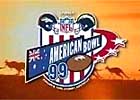
Click '99 logo for some
photos of the big day



|

|
The
GLORY YEARS
1919-49 ~ The Lambeau Era
With good financial backing during the 1920s Lambeau began
to sign up, not only college stars from all over the country, but also
some unknowns who turned out to be "greats." Finally in 1929 Green Bay
won the national professional football championship for the first time.
It went on to repeat this feat in 1930 and 1931. These teams were hailed
all over the country as some of the greatest ever. They included all-time
pro greats such as Red Dunn, Verne Lewellen, Cal
Hubbard, Bo Molenda, Francis "Jug" Earp,
Mike Michalske, Johnny
"Blood" McNally, Bill Kern, Arnie
Herber, Clarke
Hinkle, Lavvie Dilweg, Tom Nash, Milt Gantenbein and Hank Bruder.
| When the NFL's first "super-end" Don
Hutson came to the club in 1935 he had an immediate impact.
Literally from his first game he became the "terror of the league" and the secret
of Green Bay's next three championships. With Herber
and Cecil Isbell pitching and Hutson catching anything they threw at him
despite any kind of a 'stop-Hutson defense', Green Bay won championships
in 1936, 1939 and 1944, and all during the Hutson era the Packers always
finished in the first division. , |

Herber in flight |
1960-68 ~ The Lombardi Era
In 1959 the Packers announced the signing of New York Giants assistant Vince Lombardi as head
coach and general manager. In his first season, Lombardi lifted the Packers
to a 7-5 record and unanimously was voted 'Coach of the Year'. Then in
1960, the Packers captured the Western Division title and went on to win
World Championships in 1961, 1962, 1965, 1966 and 1967. (The later two
being Superbowls I & II)
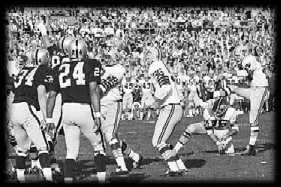
Never finishing lower than second since 1960, his teams
became the standard of football excellence and the Packer franchise one
of the most successful. Over a nine-year span as head coach, Lombardi's
teams racked up 98 victories against 30 losses and 4 ties for a remarkable
.758 winning percentage. Even more noteworthy, however, is the record of
Lombardi coached teams in postseason play. In 10 division playoffs and
World Championship games, the Packers emerged victorious nine times.

Click for more information
1992-98 ~ Wolf-Holmgren Era
The grim and miserable period of the 1970s & 80's only
resulted in five winning seasons. As this malaise started to creep
into the early 90's, it was generally regarded that the Packers organisation
could not win because it was too rooted to the Titletown Days of the 60's,
haunted by the ghosts of Lombardi. As the stadium would fill regardless
of the results they lacked a motivation to win. So too the era of unrestricted
free agency would swamp the tiny town of Green Bay who would be unable
to attract big name players.
These myths began to be unravelled initially by Bob Harlan
who hired Ron Wolf in November 1991 as executive vice-president and general
manager. A month later Wolf sacked the hapless Lindy Infante and appointed
Mike Holmgren (offensive coordinator for the extremely successful San Francisco
49ers) as the 11th head coach in Packers history.
This move augured well for the club as Holmgren directed
the Packers to a 9-and-7 record and within striking range of the playoffs
in his first season. This was only the third time in Packer's history that
a head coach had posted a winning record in his first season, a record
which was also dominated by a six-game winning streak, the longest by a
Packers team since 1965.
After three more winning seasons, the Packers put together
one of the hallmark seasons in their history in 1995. Winning six of their
last seven games, they captured their first NFC Central Division championship
since 1972, then made their best postseason showing in over a quarter-century,
forging all the way to the National Football Conference Championship Game
for the first time since 1967. En route, they closed out the regular season
with an 11-5 record - their best since 1966, when they posted a 12-2 mark
in capturing the NFL title. (Interestingly that year despite the efforts
of Holmgren, it was Ray Rhodes who won the Coach of the Year award!) |
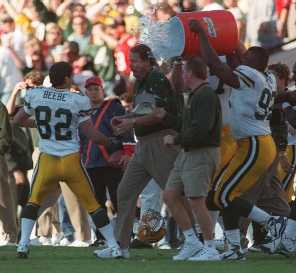
|
One by one the various myths about the Packers had been
debunked by Wolf and Holmgren. The only lingering question lay about their
Superbowl aspirations.
With nearly three decades of disappointment and frustration
emphatically behind them, the Packer's 1996 season richly rewarded their
long-patient faithful. In sweeping to a 13-3 record and their second consecutive
NFC Central Division championship, the Packers would go on to extend their own league
record of 11 NFL championships. After two playoff victories, the team secureed
the winningest season in the franchise's history. They then proceeded on
to their first Super Bowl title since 1967, where they dispatched the New
England Patriots 35-21 in SB XXXI at the Louisiana Superdome.
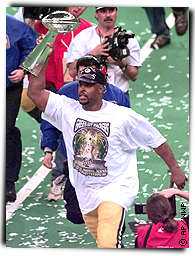
With this victory the Packers joined an elite group of teams
which have won three-or-more Super Bowls namely- the Dallas Cowboys, San
Francisco 49ers, Pittsburgh Steelers, Oakland/Los Angeles Raiders and Washington
Redskins.
The Packers followed up in 1997 with a 13-3 season, their
3rd consecutive NFC Championship and a return trip to the Superbowl. Unfortunatly
the Denver Broncos hadn't read the script and became the first AFC team
since 1981 to take out the Superbowl with a 31-24 victory over the Green
and Gold.
1998 started as a year full of promise following an undefeated
preseason. And despite some brilliant individual performances through the
season including Reggie White's 16 sacks, a variety of factors including
injury woes, salary cap restrictions and a depleted secondary saw the team's
form drop to a 11-5 season. Scraping into the playoffs as a Wild card the
Pack went down to the 49ers in what proved to be a controversial game.
The Packers players and fans finished out the season wondering what might
have been.
2010 ~ McCarthy & Rodgers: The Next Chapter
After a period of rebuilding following the retirememnt of Ron Wolf and the eventual end to the Brett Farve soap opera, 2010 saw Coach Mike McCarthy led the Packers to a 10-6 finish. Green Bay Packers quarterback Aaron Rodgers had gone from stat-sheet filler to playoff-caliber starter to champion in only his 3rd regular season as the starter of a team that never did trail by more than seven points during the entire season, and their six losses were by a combined total of 20 points. Their 10-6 record was good enough for 2nd in the NFC North, behind the arch-rival Chicago Bears, with whom they split victories in the regular season.
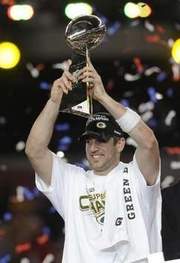 |
They finished as the sixth seed in the NFC and went on to the Playoff rounds to firstly defeat the 3rd seeded Philadelphia Eagles and then the number one seeded Atlanta Falcons. They played the 2nd seeded Chicago Bears for the third time that season in the NFC Championship game, which they won 21-14 to advance to Super Bowl XLV where they played the Pittsburgh Steelers. The Green Bay Packers then proceeded to defeat the Pittsburgh Steelers 31-25 to win their fourth Super Bowl and 13th NFL title overall. With four Super Bowls, they also now only trail Pittsburgh (6), Dallas (5) and San Francisco (5).
|
Off the field, the Packers remain a financially-sound, competitive and historically-rich franchise. On the field the "GLORY Years" seem to be back with a team that odd-makers have already tabbed as the favorite to win it again in season 2011 (if there is a season played). There�s indeed a strong argument, that the Packers will be more talented heading into 2011 than they were winning the Super Bowl with a number of staters on injured reserve in 2010 returing including one of their best players, tight end Jermichael Finley.
For the many thousands of Packer's fans around the world, the future looks extremely rosey. Stay tuned good reader for the next exciting installment of this compelling team.
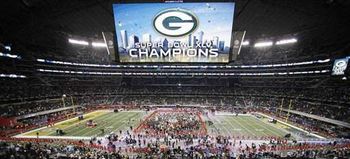


|

|
|